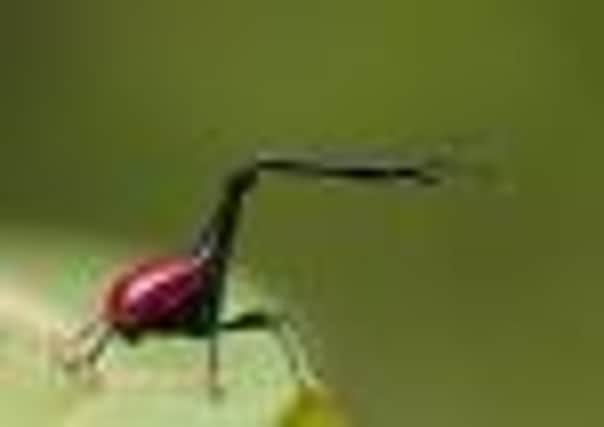Lothian scientists help unlock mysteries of insect kingdom in BBC’s Alien Nation


Cutting open an insect’s digestive tract is not for the squeamish – you’re unlikely to find sugar and spice and all things nice all nicely stored away inside there – but Dr Logan is on a mission to reveal what makes bugs tick and prove that it’s the small wonders which go on inside the world’s most numerous creatures that makes them the most successful species on the planet.
From tonight, he and a host of other scientists are at the helm of a new BBC television series, Alien Nation, which aims to cast a light on the miniature realm of insects in an unprecedented way – from re-creating a leafcutter ant colony to investigate insect culture to asking if eating bugs cuisine could end global hunger. And using cutting-edge photography and imagery a bug’s life is writ colourfully large.
Advertisement
Hide AdAdvertisement
Hide Ad“Insects outnumber people by 200 million to one and they thrive in environments where humans wouldn’t last minutes,” says Dr Logan, whose own interest in bugs began as a schoolboy in North Berwick, “So that has to be fascinating, surely? We mostly perceive them as pests, but without them entire ecosystems would collapse, crops would disappear and waste would pile high.


“The secret of their success is their incredible anatomy, which is pretty alien to our own,” he says. “Some of it looks the same, but take the cockroach, it has a pouch called a crop where it can store partially digested food, just in case it needs to go without for a few days. It’s an amazing piece of equipment in an insect which can find food virtually anywhere on the planet – and that is what makes them so successful.”
Along with United States entomologist Brendan Dunphy, Dr Logan carrys out dissections using cutting-edge imaging technology which can show the precision of the natural engineering within the smallest and simplest of insects. Stripping back the layers, they uncover ingenious body systems and finely tuned senses – a bug body plan that is the hidden blueprint behind insects’ global domination.
However, if that all sounds rather too gruesome, the Alien Nation series begins rather more gently tonight with Edinburgh-born Dr George McGavin’s Planet Ant. According to Dr McGavin – and leafcutter expert Professor Adam Hart – ant colonies are one of the wonders of nature: complex, organised, and ultimately mysterious as normally all that can be seen by humans is happens above ground.
So to get round that problem the programme-makers built a massive, full-scale ant nest complete with cameras to see its inner workings.


“The nest is a home for a million-strong colony of leafcutter ants from Trinidad,” says Dr McGavin, who at times is left gasping in pain by getting a little too close to the colony’s soldier ants. “We looked at their behaviour for a month, using time-lapse cameras, microscopes, microphones and radio tracking technology.”
The programme explores how these tiny insects achieve spectacular feats of collective organisation. It also reveals the workings of one of the most complex societies in the natural world – and shows the surprising ways in which ants are helping us solve global problems.
Watching them at work, Dr McGavin says: “The ants are finely tuned leaf-cutting machines and a large colony can consume the same weight of vegetation a day as a cow. It’s fantastic to watch them. If you just looked at them, what they do would seem random, but it clearly isn’t.
Advertisement
Hide AdAdvertisement
Hide Ad“The cameras allowed us to watch how they cut the leaves – they don’t use their mandibles like scissors. The right hand one anchors the leaf, the other is used more like a guillotine. It’s incredibly powerful and enables the ant to slice through the toughest of leaves. Then they take those leaves and head down into the nest through the tubes towards the fungus gardens they’ve created. There, smaller and smaller ants chop up the fragments until they’re mashed into a kind of mulch. This is then inserted into the growing fungus. There’s nothing haphazard about it. The pattern of ridges and hollows allows them to fit more fungus into a confined space and nurture the brood. It’s a production line . . . a conveyor belt.”
The programme also looks at how research into ant life is leading to breakthroughs in computing, industrial manufacturing and even the way we communicate with each other.
The other programmes in the series focus on whether insect cuisine could be the key to future human eating habits, the amazing migration of the Monarch butterfly, nature’s ultimate evolutionary magic trick, metamorphosis and how the Edwardians filmed insects.
Marcus Herbert, executive producer of the three BBC Scotland “insect” programmes, says: “Our team had worked with Dr McGavin to get the lowdown on decay for the award-winning documentary After Life – The Strange Science of Decay, and we were inspired by using time-lapse and microscopic photography and the ways these can help reveal hidden worlds.
“Having put our rotbox for After Life at Edinburgh Zoo, we based our ant colony – the largest man-made ant nest in Europe – at the Glasgow Science Centre and put the cameras on the ants for a month and it has really provided a fascinating picture of a normally hidden world.
“As part of the package of programmes we also got into the amazing mechanics of insects’ bodies and their amazing metamorphosis – to help provide an insight into a life force that is all around us, often unnoticed but absolutely vital and powerful.”
• Alien Nation begins tonight with Planet Ant on BBC Four at 9pm. Insect Dissection: How Insects Work is on BBC Four on Wednesday, March 20 from 9pm.